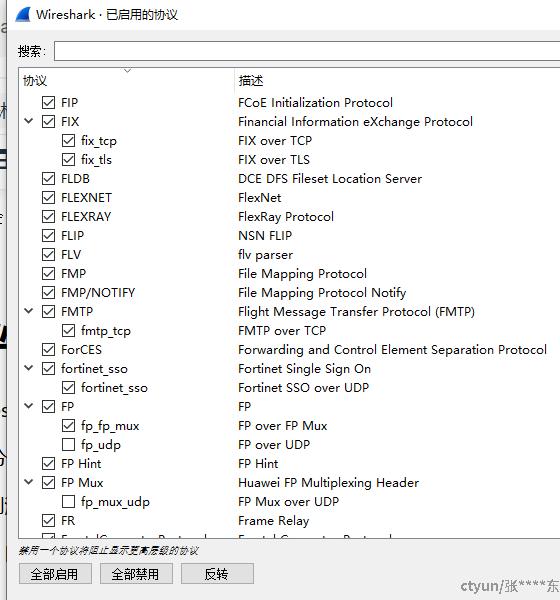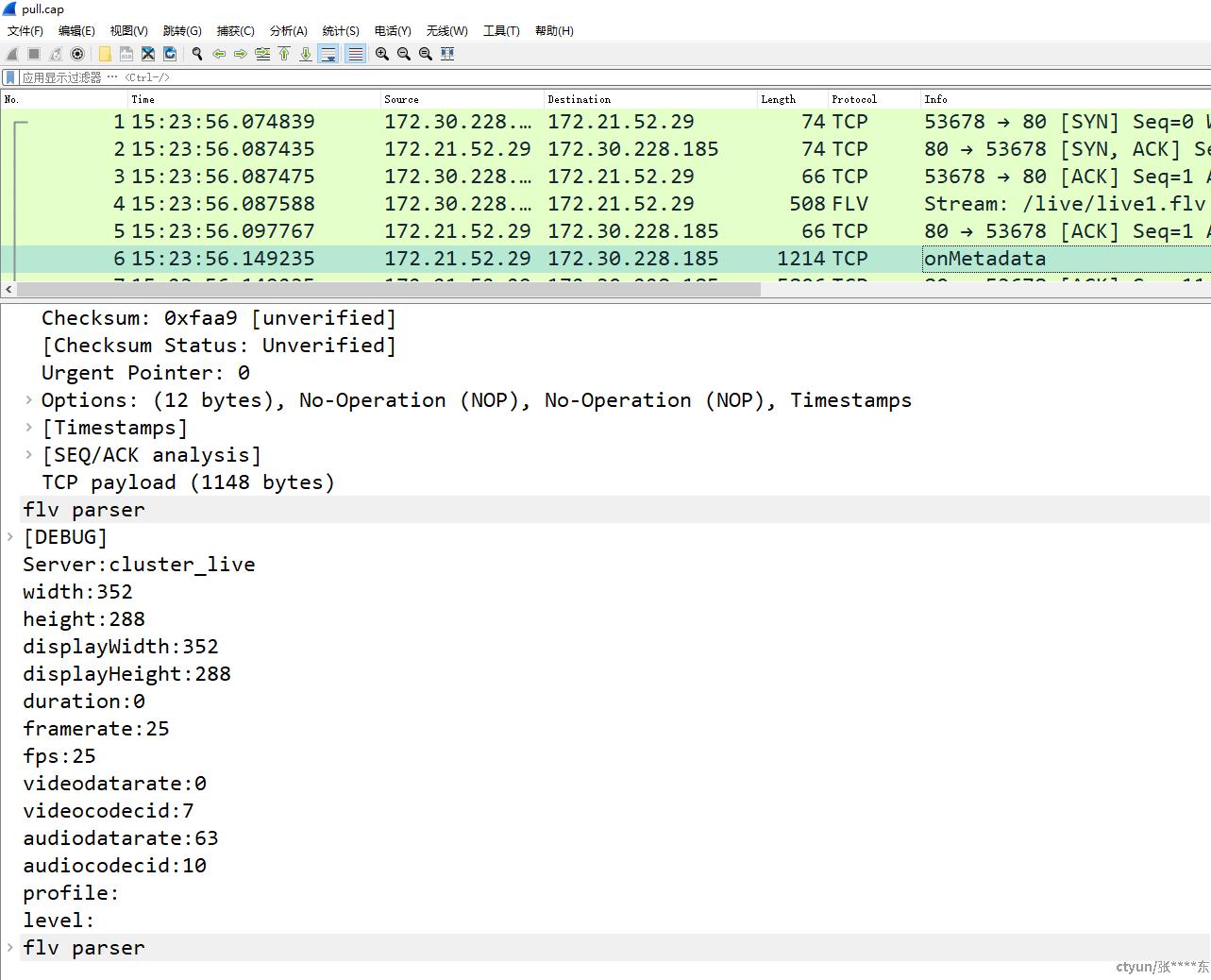1 插件支持的语言
插件支持c, lua, python语言开发,c需要编译插件,python需要环境安装,lua基本上发行版本默认支持(在帮助->关于里面,可以看到支持的lua版本,例
Compiled (64-bit) using Microsoft Visual Studio 2022 (VC++ 14.37, build 32822), with GLib 2.72.3, with PCRE2, with zlib 1.2.12, with Qt 5.15.2, with libpcap, with Lua 5.2.4, with GnuTLS 3.6.3 and PKCS #11 support
本文以lua插件为例
2 编写插件
1 首先注册一个协议
例:
local flv = Proto("flv", "flv parser");
该协议名称为flv,描述为flv parser,后续加载该插件时会看到这些字段。
2 绑定处理的协议或端口
例:
DissectorTable.get("tcp.port"):add(80, flv)
3 实现分析函数dissector(buf, pinfo, tree)
例 function flv.dissector(buf, pinfo, tree)
其中buf是网卡捕获的数据内容
例:
buf:len()获取数据长度
local str = buf(0,len):string() 转为lua string
pinfo对应wireshark界面上方的解析框,修改pinfo的值,可以修改各个字段的内容,颜色等
例:pinfo.cols.protocol:set('FLV')可以修改protocal列的名称为FLV
tree对应wireshark界面下发的数据解析tree,修改可以改变tree的内容,或者增加子tree
例 tree:add(flv, buf(0), "flv parser")在tree界面增加一个新的模块
3启用插件
插件文件放入wireshark的插件目录,通常是Program Files\Wireshark\plugins
打开wireshark的分析->启用的协议->已启用的协议

界面中可以勾选刚添加的协议内容flv
打开抓包文件时,匹配到该协议内容的数据,就会呈现相应的info和tree内容
调试:
通过ctrl+shift+L可以重新加载lua插件
可通过增加debug tree来进行数据调试
附件:解析flv的meta
local flv = Proto("flv", "flv parser");
local f_proto = ProtoField.uint8("flv.protocol", "FLV", base.HEX)
local f_str = ProtoField.string("flv.text", "FLV")
flv.fields = {
f_proto,f_str
}
local AMF_DATA_TYPE_NUMBER = "00"
local AMF_DATA_TYPE_BOOL = "01"
local AMF_DATA_TYPE_STRING = "02"
local AMF_DATA_TYPE_OBJECT = "03"
local AMF_DATA_TYPE_NULL = "05"
local AMF_DATA_TYPE_UNDEFINED = "06"
local AMF_DATA_TYPE_REFERENCE = "07"
local AMF_DATA_TYPE_MIXEDARRAY = "08"
local AMF_DATA_TYPE_OBJECT_END = "09"
local AMF_DATA_TYPE_ARRAY = "0a"
local AMF_DATA_TYPE_DATE = "0b"
local AMF_DATA_TYPE_LONG_STRING = "0c"
local AMF_DATA_TYPE_UNSUPPORTED = "0d"
local onMetadata = "02000A6F6E4D65746144617461"
local STATUS_NONE = 0
local STATUS_BODY = 1
local STATUS_META = 2
local STATUS_DONE = 3
local dmap = {}
function debug(tree, msg)
if tree then
local dt = dmap[tree]
if dt == nil then
dt = tree:add("[DEBUG]")
dmap[tree] = dt
end
dt:add(msg)
end
end
local function hex32_to_float(str)
local num = tonumber(str, 16)
local sign = math.modf(num / (2^31))
local e = num % (2^31)
e = math.modf(e/(2^23)) - 127
local m = num % (2^23)
for i=1, 23 do
m = m / 2
end
m = m + 1
num = (-1)^sign * m * 2^e
num = tonumber(string.format('%.3f', num))
return num
end
local function hex64tofloat(str)
local num = tonumber(str, 16)
local sign = math.modf(num / (2^63))
local e = num % (2^63)
e = math.modf(e/(2^52)) - 1023
local m = num % (2^52)
for i=1, 52 do
m = m / 2
end
m = m + 1
num = (-1)^sign * m * 2^e
num = tonumber(string.format('%.3f', num))
return num
end
local function get_type(buf)
local type = string.sub(buf.data, buf.pos, buf.pos + 1)
buf.pos = buf.pos + 2
return type
end
local function get_num(buf, tree)
local str = string.sub(buf.data, buf.pos, buf.pos + 15)
local num = hex64tofloat(str)
buf.pos = buf.pos + 16
return num
end
local function get_bool(buf, tree)
local str = string.sub(buf.data, buf.pos, buf.pos + 1)
buf.pos = buf.pos + 2
if str == "01" then
return "1"
end
return "0"
end
local function get_string(buf, tree)
local len = tonumber(string.sub(buf.data, buf.pos, buf.pos + 3), 16)
buf.pos = buf.pos + 4
if len == 0 then
debug(tree, "len:"..len.." next:"..buf.pos.. " buf:"..string.sub(buf.data, buf.pos, buf.pos + 3))
return nil
end
local str = ""
for i = 1, len, 1 do
str = str .. string.char(tonumber(string.sub(buf.data, buf.pos, buf.pos + 1), 16))
buf.pos = buf.pos + 2
end
debug(tree, "len:"..len.." " .. str.. " next:"..buf.pos)
return str
end
local function parse_meta(buf, subtree)
local type = get_type(buf)
if buf.pos<buf.len - 15 then
debug(subtree, "pos:".. buf.pos.. " type:"..type.. " buf:"..string.sub(buf.data, buf.pos, buf.pos + 15))
else
debug(subtree, "pos:".. buf.pos.. " type:"..type.. " buf:"..string.sub(buf.data, buf.pos, buf.len - buf.pos))
end
if type == AMF_DATA_TYPE_NUMBER then
local num = get_num(buf, subtree)
return num
elseif type == AMF_DATA_TYPE_BOOL then
local num = get_bool(buf, subtree)
return num
elseif type == AMF_DATA_TYPE_STRING then
local str = get_string(buf, subtree)
return str
elseif type == AMF_DATA_TYPE_OBJECT then
while buf.pos < buf.len do
if not buf.key then
buf.key = get_string(buf, subtree)
if buf.key == nil then
parse_meta(buf, subtree)
end
else
local ret = parse_meta(buf, subtree)
if ret == nil then
return
end
subtree:add(buf.key .. ":".. ret)
--debug(subtree, "key:"..buf.key.." val:" .. ret)
buf.key = nil
end
end
elseif type == AMF_DATA_TYPE_ARRAY then
buf.depth = buf.depth + 1
--todo
elseif type == AMF_DATA_TYPE_DATE then
elseif type == AMF_DATA_TYPE_MIXEDARRAY then
buf.pos = buf.pos + 8
while buf.pos < buf.len do
if not buf.key then
buf.key = get_string(buf, subtree)
if buf.key == nil then
parse_meta(buf, subtree)
end
else
local ret = parse_meta(buf, subtree)
subtree:add(buf.key .. ":".. ret)
--debug(subtree, "key:"..buf.key.." val:" .. ret)
buf.key = nil
end
end
elseif type == AMF_DATA_TYPE_NULL or type == AMF_DATA_TYPE_UNDEFINED or type == AMF_DATA_TYPE_UNSUPPORTED then
elseif type == AMF_DATA_TYPE_OBJECT_END then
buf.pos = buf.len
return nil
else
buf.pos = buf.len
end
end
local data_dis = Dissector.get("data")
function flv.init()
end
local function parse_body(body, pinfo, tree)
local b = string.find(body, onMetadata)
if b then
--find onMetadata
pinfo.cols.info = "onMetadata"
body = string.sub(body, b+string.len(onMetadata))
local parse = {}
parse.pos = 1
parse.data = body
parse.len = string.len(body)
parse.depth = 1
parse.key = nil
while true do
if parse.pos >= parse.len then
break
end
parse_meta(parse, tree)
end
end
end
function flv.dissector(buf, pinfo, tree)
if pinfo then
local len = buf:len()
if status then
if status == STATUS_BODY then
local str = buf(0,len):string()
local subtree = tree:add(flv, buf(0), "flv parser")
local bodybytes = buf:bytes(0, len):tohex()
parse_body(bodybytes,pinfo, tree)
end
end
if len < 10 then
elseif buf(0,4):string() == "HTTP" then
status = STATUS_BODY
local str = buf(0,len):string()
local p = string.find(str, "\r\n\r\n")
if p then
--find body
local subtree = tree:add(flv, buf(0), "flv parser")
p = string.find(str, "FLV", p + 1)
if p then
--find FLV
debug(tree, "find flv")
local bodybytes = buf:bytes(p+4, len - p - 4):tohex()
parse_body(bodybytes,pinfo, subtree)
end
end
return
elseif buf(0,3):string() == "GET" then
status = STATUS_NONE
local str = buf(0,len):string()
local p = string.find(str, ".flv")
if p then
local stream = string.sub(str, 4, p+4)
pinfo.cols.info = "Stream:" .. stream
p = string.find(str, "Host")
if p then
local p2 = string.find(str, "\n", p + 1)
local host = string.sub(str, p, p2-1)
pinfo.cols.info:append(host)
end
pinfo.cols.protocol:set('FLV')
end
return
end
end
data_dis:call(buf(0):tvb(), pinfo, tree)
end
DissectorTable.get("tcp.port"):add(80, flv

